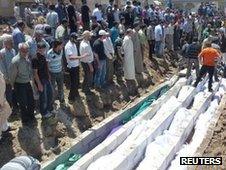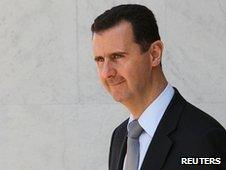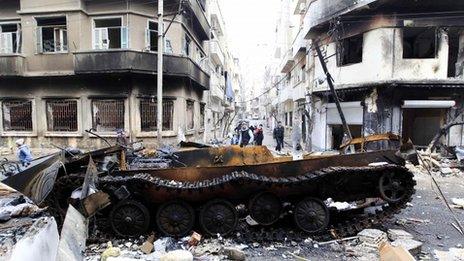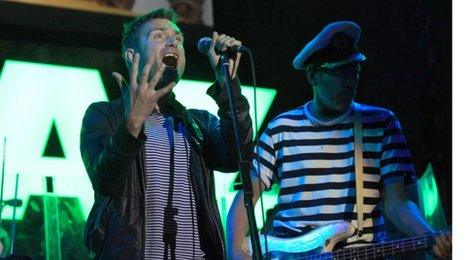Newsbeat's guide to... Syria
- Published

More than 100 people were killed in a massacre in Houla in May
A human rights group is claiming the Syrian government is using torture to try to stop rebel fighters.
It's calling for those involved to be prosecuted by the International Criminal Court.
Meanwhile, Syrian President Bashar al-Assad is quoted as saying he regrets "100%" a Turkish jet was shot down after entering Syrian airspace.
In an interview with Turkey's Cumhuriyet newspaper, he argues that the plane was flying in an area previously used by Israel's air force.
Below we explain the background to this conflict and why foreign military intervention is being avoided.
What do the protesters want?
The demonstrations began shortly after anti-government uprisings in Tunisia and Egypt in mid-March last year.
A group of teenagers spray-painted a revolutionary slogan on a wall in the southern city of Deraa.
They were arrested and soon the unrest spread to other areas.
Protesters started by calling for democracy and freedom in what is one of the most repressive countries in the Arab world.
For example, there are emergency laws which allow people to be arrested without warrants and imprisoned without trials.
Syria's president has promised some changes but protesters say the killing is continuing so they want him to step down.
Mr Assad has described protesters as terrorists who need to be removed.
Why is there no foreign military action as in Libya?
For decades Syria has been among the most stable countries in the Middle East.
It is a major player in the region because of where it's positioned, unlike Libya which is more isolated.
A military attack on Syria would cause knock-on effects in neighbouring countries.

President Assad has promised changes but protesters don't believe him
It may mobilise militant groups like Hezbollah in Lebanon, Hamas in the Gaza Strip and other more radical Palestinian groups opposed to peace with Israel.
Syria is also strongly supported by Iran - a country considered hostile by the US, Israel and Saudi Arabia - which could potentially draw those powers into a dangerous Middle Eastern conflict.
President Bashar al-Assad has warned any foreign military action will turn Syria "into another Afghanistan".
Is there any support for the president inside Syria?
Syria is a mixed country of 21 million people with a large Sunni Muslim majority and minorities of Christians, Alawites and Jewish people.
Mr Assad belongs to the Alawaite sect.
He's supported by many people from the upper classes and minority groups.
The protests against him have mainly been in Sunni populated areas.
- Published24 January 2012

- Published26 July 2010
